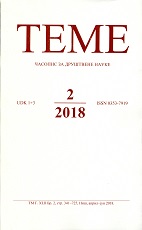Effects of International Economic Disintegration in the Case of Brexit
Effects of International Economic Disintegration in the Case of Brexit
Author(s): Ivan Marković, Milica ĐokićSubject(s): International relations/trade, Political economy, EU-Approach / EU-Accession / EU-Development
Published by: Универзитет у Нишу
Keywords: membership; the European Union; free trade effects; negotiations; alternatives
Summary/Abstract: Although in recent years, even decades, there has been a trend towards closer connection between countries for joint action and performance on the world political and economic scene, we are currently witnessing something quite the opposite. One of the most powerful integrations in the world - the European Union (EU) is faced with a tough test: for the first time in its history, it is confronted with the intention of the member state to leave the integration. Being a part of the integration has brought many benefits to its members, but also some limitations. At the moment, these limitations in the eyes of the authorities and the people of the United Kingdom (UK) seem much greater than the benefits gained from the membership. While many experts warn that the progress of the United Kingdom cannot be planned separately from the European Union, others claim that by regaining independence it will overcome many obstacles to faster development. One thing is certain – leaving the EU will not be an easy process, but will require extensive negotiations and analysis. Changes resulting from such a decision will be significant, particularly in the economy, and will have a strong impact on the UK’s future foreign relations with the rest of the Europe and the world. Static effects of integration are realized shortly after its formation, and two basic ones are trade creation and trade diversion. Dynamic effects are the result of market expansion and are related to the use of the effects of economies of scale and increased competition. All of the above leads to a reduction in prices, increased efficiency of the company, a greater degree of innovation and, in the final instance, to the faster economic growth and development. Withdrawal from the EU will change these relations dramatically. It is difficult to determine all the possible effects of leaving the Union and to assess the final outcome because a clear direction of this unfolding process cannot yet be predicted.
Journal: Teme - Časopis za Društvene Nauke
- Issue Year: XLII/2018
- Issue No: 2
- Page Range: 541-560
- Page Count: 20
- Language: English

